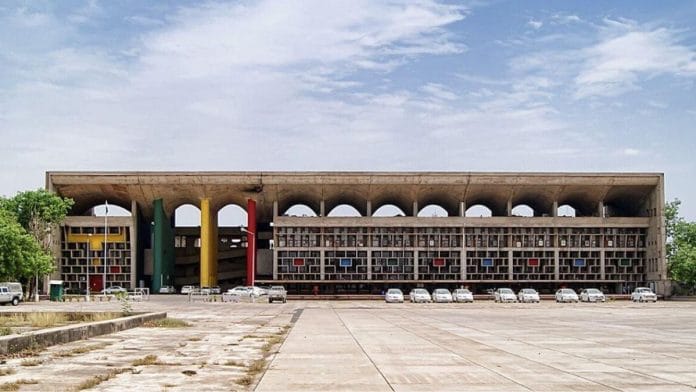Gurugram: The Punjab and Haryana High Court has dismissed the writ petition filed by retired judge Ved Pal Gupta, upholding its 2020 decision to compulsorily retire him on charges of acquiring multiple properties through corrupt means after joining the judicial service in 1987.
Gupta, a former district judge, was accused of acquiring disproportionate assets and engaging in property dealings that violated conduct rules applicable to government employees.
At the time of his entry into the judiciary in 1987, Gupta’s declared property consisted of a half share in a double-storied house in Anaj Mandi, Gohana in Sonipat district of Haryana.
However, an inquiry against him revealed a series of acquisitions by Gupta and his wife that raised serious concerns about the propriety of the dealings and their sources of funds.
The immovable properties acquired by him included multiple residential plots in Gurugram, Panchkula and Faridabad, an industrial shed in industrial model township (IMT) Manesar, and memberships in cooperative housing societies.
The high court’s disciplinary authority initiated an inquiry into Gupta’s conduct, alleging violations of Rule 15 of the Haryana Government Employees (Conduct) Rules, 1966, which prohibits engagement in trade or business without prior sanction.
The disciplinary inquiry, conducted by a senior sitting judge of the Punjab and Haryana High Court, found Gupta guilty of all charges.
Gupta and his wife acquired multiple properties whose cumulative value far exceeded their known sources of income. These properties included prime locations in Gurugram, Faridabad and Panchkula. The inquiry officer noted that some properties were registered at prices significantly below market value, suggesting possible underhand payments or benami transactions.
Also Read: Where does Aravalli end? Lack of clarity leads to rampant mining; furious Haryana villagers
Properties inherited via wills
Properties inherited by Gupta and his wife through wills were also scrutinised during the inquiry. The inquiry officer found that the wills disproportionately favoured Gupta and his wife while excluding other legal heirs without valid reasons, raising questions about their authenticity. For instance, a property in Sushant Lok, Gurugram was bequeathed to Gupta’s wife within six months of being purchased by her mother, despite the existence of other heirs.
Gupta’s defence relied on income tax returns and financial records. The inquiry found discrepancies between different sets of documents submitted by Gupta, including variations in audited accounts and balance sheets. It concluded that these records were manipulated to conceal the origins of funds used for property acquisitions.
A plot in the Mansa Devi Complex, Panchkula was purchased in his wife’s name for a declared sum of Rs 9 lakh, while its market value was estimated at over Rs 1 crore. Such transactions pointed to possible concealment of actual payments, the inquiry found.
In his civil writ petition filed in 2021, Gupta pleaded through his counsel, senior advocate Gurminder Singh, that the inquiry report was based on assumptions and lacked cogent evidence. The petitioner also contended that no adverse remarks were recorded in Gupta’s annual confidential reports (ACRs) and prior permissions were obtained for property transactions, rendering the allegations baseless.
The petitioner further argued that the inquiry officer failed to consider defence evidence adequately, and the charges were unsupported by substantial evidence and should be dismissed.
The bench, comprising Chief Justice Sheel Nagu and Justice Anil Kshetarpal, delivered a detailed judgment addressing each contention raised by the petitioner while dismissing his petition.
On the issue of prior permission, the court clarified that administrative permission for property transactions does not certify their genuineness or absolve the officer of scrutiny. Permissions are granted for procedural compliance and do not preclude disciplinary action if the transactions are later found to be questionable.
The court scrutinised the wills cited by Gupta and his wife. The court concurred with the inquiry officer’s assessment that the wills appeared to be instruments for legitimising benami transactions.
The court observed that the judicial officer’s mother-in-law had purchased a property in 1998 and, within six months, transferred it to her daughter—the petitioner’s wife—through a will.
“The inquiry revealed that the petitioner could not provide the income tax records of his mother-in-law, Smt. Chameli Devi, when requested. Upon examining the will, the inquiry officer noted that while Smt. Chameli Devi had bequeathed all other immovable properties to her three sons and the family of a predeceased son, the Sushant Lok property was exclusively transferred to the petitioner’s wife. The remaining four daughters were excluded from inheriting any immovable property, except for jewelry, which was distributed equally among all five daughters, including the petitioner’s wife,” the court observed.
The judgment highlighted significant inconsistencies in Gupta’s financial records, including manipulated income tax returns and fabricated balance sheets.
While Gupta claimed a clean service record, the court noted instances of adverse remarks in his ACRs and prior warnings from administrative judges.
The court underscored that a judicial officer is held to the highest standards of integrity. Gupta’s actions, as established by the inquiry, fell short of these expectations and tarnished the judiciary’s image, the court said.
It reiterated that its jurisdiction under Article 226 (which gives high courts the power to issue writs to enforce fundamental rights) is limited to examining the procedural correctness of disciplinary inquiries and ensuring compliance with natural justice. It emphasised that judicial review is not akin to appellate jurisdiction and does not extend to reappreciating evidence.
(Edited by Radifah Kabir)
Also Read: ‘Shareholder of illegal mining syndicate’ — what is ED’s case against Haryana MLA Surender Panwar






